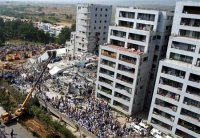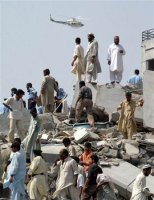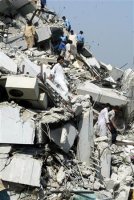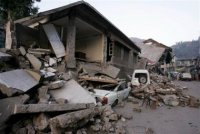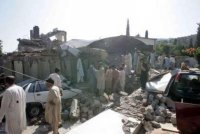MUZAFFARABAD, Pakistan (Reuters) - Rescuers searched frantically in the rubble of flattened towns and villages on Sunday for survivors of a devastating earthquake that killed more than 20,000 in northern Pakistan and India.
In worst hit Pakistan, more than 24 hours after Saturday morning's quake, hundreds of children were trapped in collapsed schools and 150 people, including foreigners, were buried in two collapsed apartment blocks in the capital, Islamabad.
Rescue teams and ordinary citizens labored with cranes and earth-moving equipment or used their bare hands in desperate searches for survivors, some complaining bitterly about the lack of assistance from badly stretched central authorities.
President Pervez Musharraf said there were difficulties reaching remote areas. He thanked foreign countries for expressions of sympathy, but said what Pakistan needed most were blankets and tents, transport helicopters and medicines.
Pledges came from around the world within hours of the disaster and the U.N. Office for Coordination of Humanitarian Affairs said the effort was "rushing against the clock".
The 7.6 magnitude quake, the biggest in Pakistan in memory, was centered in forested mountains of Pakistani Kashmir, near the Indian border, and violently jolted large parts of northern Pakistan, as well as parts of neighboring Afghanistan and India.
About 19,400 people were killed and more than 42,000 hurt in Pakistan, said Interior Minister Aftab Ahmed Khan Sherpao, with the divided Himalayan territory of Kashmir and its capital Muzaffarabad worst hit.
But the communications minister for Pakistani Kashmir, Tariq Farooq, said the toll there alone could reach 30,000 as the focus so far had been only on the main towns, not mountain villages.
In Muzaffarabad, most houses, government buildings and shops had collapsed and frightened residents spent a chilly night camped in fields, parks, graveyards and cars.
Another 558 people died in the Indian side of Kashmir, where many mud and stone houses were buried by landslides.
Pakistani military spokesman Major General Shaukat Sultan called the devastation the worst in Pakistan's history. "There are many villages that have been wiped off the face of this earth," he said.
BURIED CHILDREN
Amongst countless tragic sights, perhaps most pitiful was that of hundreds of parents using picks, shovels and their bare hands in a desperate attempt to reach 850 children trapped in the rubble of two schools in Northwest Frontier Province.
The frightened voices of trapped children and the anguished wails of parents accompanied the frantic work in the Balakot valley in the mountains of the province bordering Afghanistan.
"Save me, call my mother, call my father," came the faint voice of a boy, again and again, from the rubble of a government school in which residents said about 200 children were trapped.
"Bring out my child, bring out my child," his mother wailed, beating her chest as other parents and relatives pulled out the bodies of four children, bringing Sunday morning's toll to eight.
Pope Benedict urged a quick and generous global response.
The United States said it would provide $100,000 in emergency aid and was offering military helicopters. Britain, Japan, and the United Arab Emirates were among those sending immediate help.
Turkey, which has suffered major earthquakes, said it had sent two military planes carrying aid, doctors and rescue workers and in a further sign of easing tensions, Indian Prime Minister Manmohan Singh called Musharraf to offer assistance.
China said it was donating $6.2 million in cash and materials.
Rescue efforts have been hampered by frequent aftershocks causing panic among survivors, many of whom face a bleak immediate future with little or no food or shelter.
"I've been involved in helping refugees for the last 17 years, but I am in shock because I have never seen such devastation," said German aid agency doctor Chris Schmoter in Balakot, where almost every second woman or child bore an injury.
A Reuters reporter counted 105 bodies during an eight-km (five-mile) trek into the town. Some were laid by the road by relatives hoping for help with their burial. Others were carried on charpoys, traditional rope beds.
A boy carried a younger sister of perhaps four or five, her skin stripped off her face and the side of her body by a rock that flattened their house. He did not know what to do.
"There are no bandages or anything at all," he said. "There are no doctors, no nothing -- where should we go?"
Distraught relatives and friends of those missing in the Margala Towers apartments in Islamabad, home to expatriates and middle-class Pakistanis, waited as rescuers scoured the debris.
Musharraf said 35 bodies had been recovered from the apartments and some 80 people had been rescued, but about 150 people were still in the ruins.
The dead included two Japanese and an Egyptian, but rescuers located a buried woman on Sunday, raising hopes for others.
"It's terrible. I'm waiting for a miracle. My brother and his whole family are in there," said Brigadier Abdul Jahsor.
------------------------------------------
Another big tragedy in Holy Ramadan (Muslims Holy Month)
suzi
In worst hit Pakistan, more than 24 hours after Saturday morning's quake, hundreds of children were trapped in collapsed schools and 150 people, including foreigners, were buried in two collapsed apartment blocks in the capital, Islamabad.
Rescue teams and ordinary citizens labored with cranes and earth-moving equipment or used their bare hands in desperate searches for survivors, some complaining bitterly about the lack of assistance from badly stretched central authorities.
President Pervez Musharraf said there were difficulties reaching remote areas. He thanked foreign countries for expressions of sympathy, but said what Pakistan needed most were blankets and tents, transport helicopters and medicines.
Pledges came from around the world within hours of the disaster and the U.N. Office for Coordination of Humanitarian Affairs said the effort was "rushing against the clock".
The 7.6 magnitude quake, the biggest in Pakistan in memory, was centered in forested mountains of Pakistani Kashmir, near the Indian border, and violently jolted large parts of northern Pakistan, as well as parts of neighboring Afghanistan and India.
About 19,400 people were killed and more than 42,000 hurt in Pakistan, said Interior Minister Aftab Ahmed Khan Sherpao, with the divided Himalayan territory of Kashmir and its capital Muzaffarabad worst hit.
But the communications minister for Pakistani Kashmir, Tariq Farooq, said the toll there alone could reach 30,000 as the focus so far had been only on the main towns, not mountain villages.
In Muzaffarabad, most houses, government buildings and shops had collapsed and frightened residents spent a chilly night camped in fields, parks, graveyards and cars.
Another 558 people died in the Indian side of Kashmir, where many mud and stone houses were buried by landslides.
Pakistani military spokesman Major General Shaukat Sultan called the devastation the worst in Pakistan's history. "There are many villages that have been wiped off the face of this earth," he said.
BURIED CHILDREN
Amongst countless tragic sights, perhaps most pitiful was that of hundreds of parents using picks, shovels and their bare hands in a desperate attempt to reach 850 children trapped in the rubble of two schools in Northwest Frontier Province.
The frightened voices of trapped children and the anguished wails of parents accompanied the frantic work in the Balakot valley in the mountains of the province bordering Afghanistan.
"Save me, call my mother, call my father," came the faint voice of a boy, again and again, from the rubble of a government school in which residents said about 200 children were trapped.
"Bring out my child, bring out my child," his mother wailed, beating her chest as other parents and relatives pulled out the bodies of four children, bringing Sunday morning's toll to eight.
Pope Benedict urged a quick and generous global response.
The United States said it would provide $100,000 in emergency aid and was offering military helicopters. Britain, Japan, and the United Arab Emirates were among those sending immediate help.
Turkey, which has suffered major earthquakes, said it had sent two military planes carrying aid, doctors and rescue workers and in a further sign of easing tensions, Indian Prime Minister Manmohan Singh called Musharraf to offer assistance.
China said it was donating $6.2 million in cash and materials.
Rescue efforts have been hampered by frequent aftershocks causing panic among survivors, many of whom face a bleak immediate future with little or no food or shelter.
"I've been involved in helping refugees for the last 17 years, but I am in shock because I have never seen such devastation," said German aid agency doctor Chris Schmoter in Balakot, where almost every second woman or child bore an injury.
A Reuters reporter counted 105 bodies during an eight-km (five-mile) trek into the town. Some were laid by the road by relatives hoping for help with their burial. Others were carried on charpoys, traditional rope beds.
A boy carried a younger sister of perhaps four or five, her skin stripped off her face and the side of her body by a rock that flattened their house. He did not know what to do.
"There are no bandages or anything at all," he said. "There are no doctors, no nothing -- where should we go?"
Distraught relatives and friends of those missing in the Margala Towers apartments in Islamabad, home to expatriates and middle-class Pakistanis, waited as rescuers scoured the debris.
Musharraf said 35 bodies had been recovered from the apartments and some 80 people had been rescued, but about 150 people were still in the ruins.
The dead included two Japanese and an Egyptian, but rescuers located a buried woman on Sunday, raising hopes for others.
"It's terrible. I'm waiting for a miracle. My brother and his whole family are in there," said Brigadier Abdul Jahsor.
------------------------------------------
Another big tragedy in Holy Ramadan (Muslims Holy Month)

suzi

